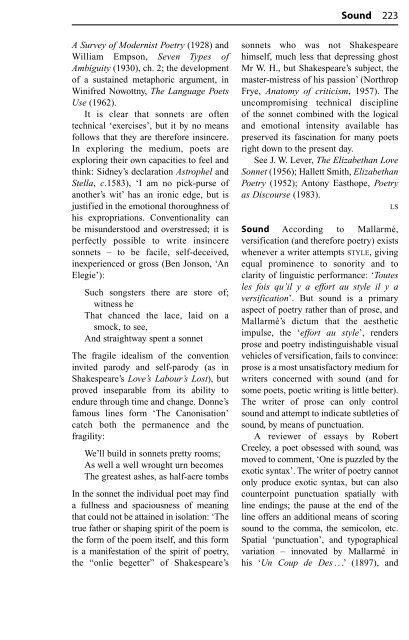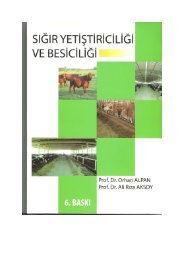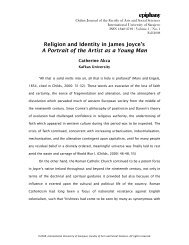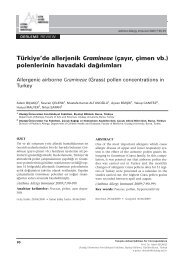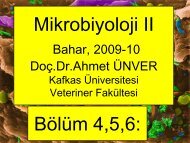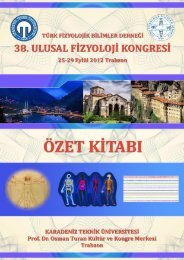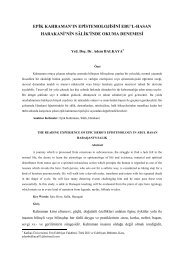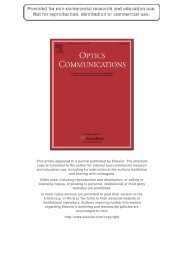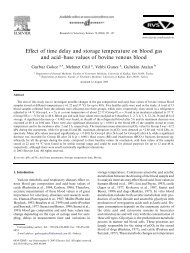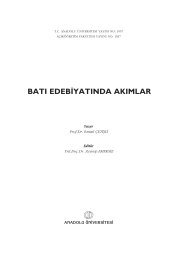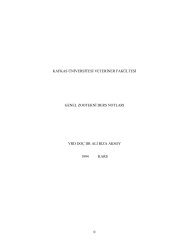The Routledge Dictionary of Literary Terms
The Routledge Dictionary of Literary Terms
The Routledge Dictionary of Literary Terms
You also want an ePaper? Increase the reach of your titles
YUMPU automatically turns print PDFs into web optimized ePapers that Google loves.
A Survey <strong>of</strong> Modernist Poetry (1928) and<br />
William Empson, Seven Types <strong>of</strong><br />
Ambiguity (1930), ch. 2; the development<br />
<strong>of</strong> a sustained metaphoric argument, in<br />
Winifred Nowottny, <strong>The</strong> Language Poets<br />
Use (1962).<br />
It is clear that sonnets are <strong>of</strong>ten<br />
technical ‘exercises’, but it by no means<br />
follows that they are therefore insincere.<br />
In exploring the medium, poets are<br />
exploring their own capacities to feel and<br />
think: Sidney’s declaration Astrophel and<br />
Stella, c.1583), ‘I am no pick-purse <strong>of</strong><br />
another’s wit’ has an ironic edge, but is<br />
justified in the emotional thoroughness <strong>of</strong><br />
his expropriations. Conventionality can<br />
be misunderstood and overstressed; it is<br />
perfectly possible to write insincere<br />
sonnets – to be facile, self-deceived,<br />
inexperienced or gross (Ben Jonson, ‘An<br />
Elegie’):<br />
Such songsters there are store <strong>of</strong>;<br />
witness he<br />
That chanced the lace, laid on a<br />
smock, to see,<br />
And straightway spent a sonnet<br />
<strong>The</strong> fragile idealism <strong>of</strong> the convention<br />
invited parody and self-parody (as in<br />
Shakespeare’s Love’s Labour’s Lost), but<br />
proved inseparable from its ability to<br />
endure through time and change. Donne’s<br />
famous lines form ‘<strong>The</strong> Canonisation’<br />
catch both the permanence and the<br />
fragility:<br />
We’ll build in sonnets pretty rooms;<br />
As well a well wrought urn becomes<br />
<strong>The</strong> greatest ashes, as half-acre tombs<br />
In the sonnet the individual poet may find<br />
a fullness and spaciousness <strong>of</strong> meaning<br />
that could not be attained in isolation: ‘<strong>The</strong><br />
true father or shaping spirit <strong>of</strong> the poem is<br />
the form <strong>of</strong> the poem itself, and this form<br />
is a manifestation <strong>of</strong> the spirit <strong>of</strong> poetry,<br />
the “onlie begetter” <strong>of</strong> Shakespeare’s<br />
Sound 223<br />
sonnets who was not Shakespeare<br />
himself, much less that depressing ghost<br />
Mr W. H., but Shakespeare’s subject, the<br />
master-mistress <strong>of</strong> his passion’ (Northrop<br />
Frye, Anatomy <strong>of</strong> criticism, 1957). <strong>The</strong><br />
uncompromising technical discipline<br />
<strong>of</strong> the sonnet combined with the logical<br />
and emotional intensity available has<br />
preserved its fascination for many poets<br />
right down to the present day.<br />
See J. W. Lever, <strong>The</strong> Elizabethan Love<br />
Sonnet (1956); Hallett Smith, Elizabethan<br />
Poetry (1952); Antony Easthope, Poetry<br />
as Discourse (1983).<br />
LS<br />
Sound According to Mallarmé,<br />
versification (and therefore poetry) exists<br />
whenever a writer attempts STYLE, giving<br />
equal prominence to sonority and to<br />
clarity <strong>of</strong> linguistic performance: ‘Toutes<br />
les fois qu’il y a effort au style il y a<br />
versification’. But sound is a primary<br />
aspect <strong>of</strong> poetry rather than <strong>of</strong> prose, and<br />
Mallarmé’s dictum that the aesthetic<br />
impulse, the ‘effort au style’, renders<br />
prose and poetry indistinguishable visual<br />
vehicles <strong>of</strong> versification, fails to convince:<br />
prose is a most unsatisfactory medium for<br />
writers concerned with sound (and for<br />
some poets, poetic writing is little better).<br />
<strong>The</strong> writer <strong>of</strong> prose can only control<br />
sound and attempt to indicate subtleties <strong>of</strong><br />
sound, by means <strong>of</strong> punctuation.<br />
A reviewer <strong>of</strong> essays by Robert<br />
Creeley, a poet obsessed with sound, was<br />
moved to comment, ‘One is puzzled by the<br />
exotic syntax’. <strong>The</strong> writer <strong>of</strong> poetry cannot<br />
only produce exotic syntax, but can also<br />
counterpoint punctuation spatially with<br />
line endings; the pause at the end <strong>of</strong> the<br />
line <strong>of</strong>fers an additional means <strong>of</strong> scoring<br />
sound to the comma, the semicolon, etc.<br />
Spatial ‘punctuation’, and typographical<br />
variation – innovated by Mallarmé in<br />
his ‘Un Coup de Des . . .’ (1897), and


